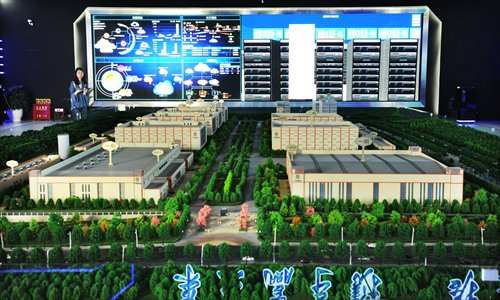HOME >> CHINA
Seven ‘new infrastructure’ to lift economy
By Wang Cong and Huang Ge Source:Global Times Published: 2020/3/9 23:16:56 Last Updated: 2020/3/10 10:06:27
Investments offer relief, sustainable boost: analysts

A staff member tests the speed with a Huawei 5G mobile phone at Huawei 5G Innovation and Experience Center in London, UK, in January. Photo: Xinhua
As the global economy is reeling from the widespread coronavirus epidemic, and major economies around the world are still stumbling to come up with a response to the economic fallout, a new wave of investments in what Chinese officials and analysts have aptly dubbed "new infrastructure" that could offer both short-term relief and a long-term boost to the economy is gaining traction across the country.
Massive spending in several areas from 5G to artificial intelligence (AI) to ultra-high voltage power transmission is markedly different from investments in traditional infrastructure projects such as new roads and could instantly spur more efficient economic activities, reshape consumer spending and pave the way for sustainable growth, analysts said on Monday.
'New infrastructure'
Investment in 5G infrastructure is leading the way, with a rising number of local governments and companies rolling out dozens of projects that are reportedly worth hundreds of billions of dollars.
At the end of February, provincial-level governments across the country have published a total of 200 5G development plans, according to a report from the China Academy of Information and Communications Technology (CAICT) on Friday. Among other projects, China could build as many as 40 new 5G base stations in 2020, which would bring the total to 55, the CAICT said.
While specific value for the 5G infrastructure projects this year remains elusive, total investments could reach 1.2 trillion yuan ($172.83 billion) by 2025, the CAICT said in another report on Wednesday, noting that 5G investment could prompt an additional investment of 3.5 trillion in other related sectors.
"More importantly, 5G network development is conducive to nurturing the online economy, AI, digital economy, internet financing and new technology industries and could potentially lead to a [multitrillion dollar] new economy," Ren Zeping, chief economist for the Guangzhou-based Evergrande Group, wrote in a report on Friday.

The Big Data center in Guiyang, Southwest China's Guizhou Province Photo: CFP
Ren argued that investing in 5G and other "new infrastructure" is the "simplest and most effective way" to cope with an economic downturn due to the epidemic and is the "winning hands" in dealing with foreign competition against the backdrop of China-US trade tensions.
Apart from 5G, Chinese officials have also identified six other areas that are expected to see increases in investments this year and beyond: AI, industrial internet, big data centers, ultra-high voltage power transmission, high-speed rail, subways and charging facilities for new-energy vehicles.
In total, investments in these seven areas could exceed 2 trillion yuan this year, according to a report from the Beijing-based CITIC Securities on Monday, noting that such policy has been long existed in the making and the epidemic helped accelerate the pace.
Chinese policymakers mentioned the phrase "new infrastructure" as early as 2018, but since the coronavirus outbreak, top officials have repeatedly called for accelerated efforts in these sectors and offered policy support in land use, capital and other areas, as part of efforts to cope with the epidemic's economic impact.
Analysts said that in the short term, these investments could revitalize the entire industrial supply chain, from research and development to manufacturing, assembling, engineering and constructing, offering to cushion any potentially serious pain the epidemic might have inflicted on the economy.
More than spurring investment activities in a wide range of sectors, investment in these "new infrastructures" may also foster new business models and boost consumption - the Chinese economy's biggest growth driver, analysts said.
"This doesn't just only include infrastructure but also new emerging industries that connect massive investments and demand in a constantly improving consumer market. It is the new engine for growth in the Chinese economy," Reng said.
"New infrastructure would bring comprehensive economic results several times more than traditional infrastructure investment stimulus in terms of GDP growth, employment increases and industrial advancement," Yang Yiqing, professor at Zhejiang Gongshang University, told the Global Times on Monday.
Investing in the future
Unlike some of the previous stimulus packages, including the 4 trillion-yuan stimulus after the global financial crisis in 2008, which some said has resulted in overproduction and unnecessary debt, the new investments are driven by organic demand both at home and abroad and expected to foster high-quality, sustainable growth in the long run.
Most of the seven sectors are widely expected as crucial sectors for future growth in not just China but the entire world, and China is already one of the leading forces in some of those areas, including 5G, AI and high-speed rail. More investments could also further consolidate China's leading position to cash in on the massive potential overseas.
In the case of 5G, for example, China is already home to half of the world's total base stations and the largest user base, according to some reports. Since the launch of its commercial use in November 2019, the number of 5G users in China has exceeded 30 million, the Economic Daily newspaper reported on Saturday.
That number is expected to rise to as many as 700 million by 2024, and globally, total number of users could reach 1.57 billion by 2025, according to various reports.
China's investments in 5G infrastructure could help lower costs for deployment in other countries, Ma Jihua, a Beijing-based industry analyst, told the Global Times on Monday, adding that there is also a global market for new infrastructuresas China takes the lead in policies and investment.
However, some experts also cautioned against potential risks and uncertainties from investments in these areas and called for a more coordinated approach.
"Homogenous construction and repetitive investment are likely to emerge, reducing industrial overcapacity and wasting resources," Li Meng, research fellow with the Shanghai-based Academy of Culture and Tourism, told the Global Times on Monday.
Still, Li argued that investment in "new infrastructure" is not from the "old playbook of China's 4 trillion yuan stimulus package [in 2008-09]."
Posted in: SOCIETY